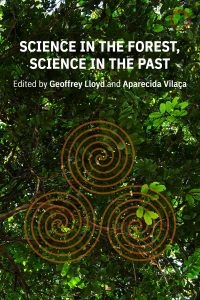Edited by Geoffrey E. R. Lloyd and Aparecida Vilaça
This collection brings together leading anthropologists, historians, philosophers, and artificial-intelligence researchers to discuss the sciences and mathematics used in various Eastern, Western, and Indigenous societies, both ancient and contemporary. The authors analyze prevailing assumptions about these societies and propose more faithful, sensitive analyses of their ontological views about reality—a step toward mutual understanding and translatability across cultures and research fields.
Science in the Forest, Science in the Past is a pioneering interdisciplinary exploration that will challenge the way readers interested in sciences, mathematics, humanities, social research, computer sciences, and education think about deeply held notions of what constitutes reality, how it is apprehended, and how to investigate it.
“Is there one big Science, or are there many legitimate forms of knowledge? Are primary qualities the sole object of scientific inquiry, or is there a space for investigating the multidimensionality of phenomena? Are the ontological foundations of different systems of worlding incompatible, or do they allow hybridization and the expression of foundational principles? This innovative book tackles these questions afresh by bringing together an impressive set of international scholars in fields ranging from ancient civilizations and non-Western cultures to the computing sciences. Their deconstruction of the sterile deadlock between universalism and relativism will be a milestone for years to come.”
— Philippe Descola, Professor Emeritus, Collège de France, author of Beyond Nature and Culture
Contributions by Geoffrey E. R. Lloyd, Aparecida Vilaça, Marilyn Strathern, Serafina Cuomo, Mauro W. B. de Almeida, Karine Chemla, Agathe Keller, Manuela Carneiro da Cunha, Alan F. Blackwell, Willard McCarty, Stephen Hugh-Jones, and Nicholas Jardine.
Geoffrey E. R. Lloyd is Professor Emeritus of Ancient Philosophy and Science at the University of Cambridge, where he was Master of Darwin College from 1989 to 2000. He has published over thirty books, most recently Being, Humanity and Understanding (Oxford University Press, 2012) and The Ambivalences of Rationality: Ancient and Modern Cross-Cultural Explorations (Cambridge University Press, 2018).
Aparecida Vilaça is Professor of Social Anthropology at the National Museum, Federal University of Rio de Janeiro. She is the author of Strange Enemies: Indigenous Agency and Scenes of Encounters in Amazonia (Duke University Press, 2010) and Praying and Preying: Christianity in Indigenous Amazonia (University of California Press, 2016), among others.
SCIENCE IN THE FOREST, SCIENCE IN THE PAST
Contents
Preface
Geoffrey E. R. Lloyd and Aparecida Vilaça
Acknowledgments
Chapter 1. The Clash of Ontologies and the Problems of Translation and Mutual Intelligibility
Geoffrey E. R. Lloyd
Chapter 2. Inventing Nature: Christianity and Science in Indigenous Amazonia
Aparecida Vilaça
Chapter 3. A Clash of Ontologies? Time, Law, and Science in Papua New Guinea
Marilyn Strathern
Chapter 4. Mathematical Traditions in Ancient Greece and Rome
Serafina Cuomo
Chapter 5. Is there Mathematics in the Forest?
Mauro William Barbosa de Almeida
Chapter 6. Different Clusters of Texts from Ancient China, Different Mathematical Ontologies
Karine Chemla
Chapter 7. Shedding Light on Diverse Cultures of Mathematical Practices in South Asia: Early Sanskrit Mathematical Texts in Conversation with Modern Elementary Tamil Mathematical Curricula (in Dialogue with Senthil Babu)
Agathe Keller
Chapter 8. Antidomestication in the Amazon: Swidden and its Foes
Manuela Carneiro da Cunha
Chapter 9. Objective Functions: (In)humanity and Inequity in Artificial Intelligence
Alan Blackwell
Chapter 10. Modeling, Ontology, and Wild Thought: Toward an Anthropology of the Artificially Intelligent
Willard McCarty
Chapter 11. Rhetorical Antinomies and Radical Othering: Recent Reflections on Responses to an Old Paper Concerning Human–Animal Relations in Amazonia
Stephen Hugh-Jones
Chapter 12. Turning to Ontology in Studies of Distant Sciences
Nicholas Jardine
Chapter 13. Epilogue: The Way Ahead
Geoffrey E. R. Lloyd and Aparecida Vilaça
![]() The open-access PDF of this book, attached above, is made available by Hau Books through a Creative Commons license BY-NC-ND 4.0 International (Attribution Required / Non-Commercial Use / No Derivatives). Additional rights clearance may be necessary for third-party content within.
The open-access PDF of this book, attached above, is made available by Hau Books through a Creative Commons license BY-NC-ND 4.0 International (Attribution Required / Non-Commercial Use / No Derivatives). Additional rights clearance may be necessary for third-party content within.
